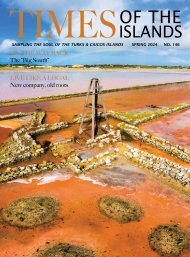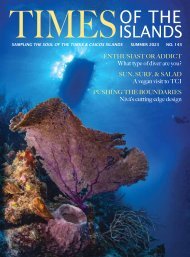Times of the Islands Summer 2024
Presents the "soul of the Turks & Caicos Islands" with in-depth features about local people, culture, history, environment, real estate, businesses, resorts, restaurants and activities.
Presents the "soul of the Turks & Caicos Islands" with in-depth features about local people, culture, history, environment, real estate, businesses, resorts, restaurants and activities.
Create successful ePaper yourself
Turn your PDF publications into a flip-book with our unique Google optimized e-Paper software.
green pages newsletter <strong>of</strong> <strong>the</strong> department <strong>of</strong> environment & coastal resources<br />
HEIDI HERTLER<br />
ecosystems on <strong>the</strong> planet.<br />
Coral reefs, including those in<br />
<strong>the</strong> Turks & Caicos, provide economic<br />
value through coastal protection,<br />
fisheries, and tourism. Reefs absorb<br />
some <strong>of</strong> <strong>the</strong> impact <strong>of</strong> ocean waves,<br />
protecting <strong>the</strong> coastline from being<br />
damaged and eroded, especially<br />
during intense storms and hurricanes.<br />
Coral reefs form protective<br />
barriers that enclose lagoons, providing<br />
nursery habitats and feeding<br />
grounds for fish and o<strong>the</strong>r organisms<br />
that serve as a primary source <strong>of</strong> protein<br />
in many tropical countries. Many<br />
<strong>of</strong> <strong>the</strong>se countries also have tour-<br />
From top: School for Field Studies research assistant Miranda Williams checks on coral fragments,<br />
with bleached Orbicella annularis coral nearby. Ocean temperatures reached record<br />
heights in 2023, causing widespread coral bleaching.<br />
School for Field Studies students Adriana Yeo and Claudia Buckenmeyer maintain coral nursery<br />
structures and promote coral growth by removing algae.<br />
ism-based economies, which rely on<br />
coral reefs to draw visitors. Estimates<br />
<strong>of</strong> <strong>the</strong> total economic value <strong>of</strong> coral<br />
reefs worldwide vary but are in <strong>the</strong><br />
range <strong>of</strong> tens <strong>of</strong> billions <strong>of</strong> dollars<br />
every year.<br />
Corals in crisis<br />
Sadly, coral reefs are now facing several<br />
threats to <strong>the</strong>ir existence. As<br />
global temperatures rise, marine heat<br />
waves have become more frequent<br />
and severe. In <strong>the</strong> summer <strong>of</strong> 2023,<br />
<strong>the</strong> Caribbean experienced record<br />
ocean temperatures, with a buoy <strong>of</strong>f<br />
<strong>the</strong> Florida coast reading a stunning<br />
temperature <strong>of</strong> 101.1°F (38.39°C)<br />
in July. As a result, reefs across <strong>the</strong><br />
region, including here in <strong>the</strong> Turks &<br />
Caicos, experienced a mass bleaching<br />
event. Bleaching occurs when corals<br />
become heat-stressed and expel <strong>the</strong><br />
zooxan<strong>the</strong>llae that live inside <strong>the</strong>ir<br />
tissues. Without <strong>the</strong>ir zooxan<strong>the</strong>llae,<br />
corals lose <strong>the</strong>ir vibrant coloring<br />
and main source <strong>of</strong> energy. Bleached<br />
corals are likely to die unless water<br />
temperatures drop immediately.<br />
The threat <strong>of</strong> bleaching is coinciding<br />
with existing coral stressors like<br />
overfishing, disease, and pollution.<br />
In 2008, elkhorn and staghorn corals<br />
around South Caicos were ravaged<br />
by white band disease, and in 2019<br />
stony corals in TCI were devastated<br />
by stony coral tissue loss disease<br />
(SCLTD), resulting in a 62% loss <strong>of</strong><br />
coral coverage on reefs around South<br />
Caicos. While <strong>the</strong>se diseases are no<br />
longer prevalent in TCI, <strong>the</strong>y have<br />
exacerbated <strong>the</strong> threat now posed by<br />
bleaching. Unless <strong>the</strong>se challenges<br />
are addressed, many corals could<br />
soon be driven to extinction, spelling<br />
disaster for <strong>the</strong> communities that<br />
depend on <strong>the</strong>m.<br />
34 www.timespub.tc
















